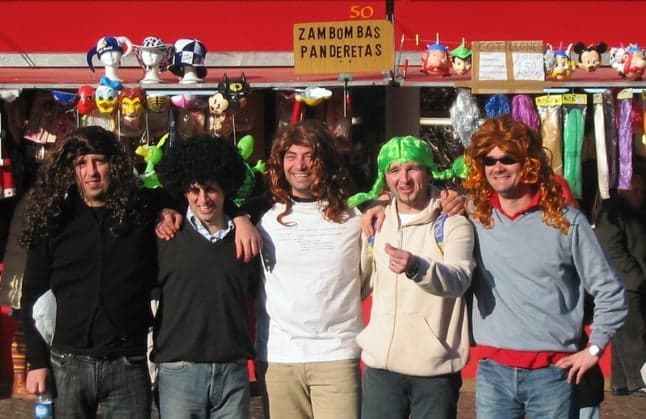Why this Spanish village celebrates New Year's Eve in August

The Andalusian village of Bérchules will not be celebrating the end of 2023 at the same time as everyone else, instead they will have their countdown and grape-eating in early August. Here's the fascinating reason why.
As the rest of Spain and most of the world make their final preparations for New Year's plans, there is one village in rural Andalucia that won’t be.
And they never do, in fact. Not in December, anyway.
Why not? Because they celebrate the New Year in August instead.
Hidden away high in the Alpujarras region of Andalusia in Granada province, Bérchules has, for the last 28 years, celebrated New Year's in August.
The story goes back to New Year’s Eve 1993, when party preparations were well underway and the town awaited ‘94.
But sometime that evening, just a few hours before midnight, bad weather caused a power cut that left the village in the dark as locals prepared for the new year countdown.
READ ALSO: The New Year’s Eve events taking place in Spain’s main cities
Bérchules eventually held its New Year's party on August 6th 1994, hoping to recover not only the festive spirit but some of the lost hospitality earnings, and the move has become a tradition since.
In recent years, the strange custom has attracted visitors: it is estimated as many as 10,000 now attend the August New Year’s bash, in a pueblo of around 700.
Much of the year is spent planning for the summer celebration: preparations for the party begin as early as January, and as August is historically a month full of fiestas in Spain, in a town so small hosting a party so big with just one road in and one road out, it's important they get everything right.
Despite taking place in August, during the notoriously hot Andalusian summer, the people of Bérchules still have all the typical Christmas traditions of the holiday season.
Polverones, turrones, and mantecados are all enjoyed, as there are 3,000kg of them to supply the high summer demand in Bérchules.
READ ALSO - Polvorones: How the driest shortbread ever became a Christmas special in Spain
They even have the Three Wise Men on horseback, and grapes are sold a dozen a piece for those wishing to stick with Spain's New Year tradition, while a small shop sells Santa hats and reindeer horns.
Bérchules’ August New Year celebrations are so popular, and such a draw for outsiders, that the Andalusian government has recognised the tradition as an official Festival of Tourism Interest.
Article by Conor Faulkner, who coincidently was born on the exact same day as Bérchules experienced the power cut that led to its festival New Year's tradition.
Comments
See Also
As the rest of Spain and most of the world make their final preparations for New Year's plans, there is one village in rural Andalucia that won’t be.
And they never do, in fact. Not in December, anyway.
Why not? Because they celebrate the New Year in August instead.
Hidden away high in the Alpujarras region of Andalusia in Granada province, Bérchules has, for the last 28 years, celebrated New Year's in August.
The story goes back to New Year’s Eve 1993, when party preparations were well underway and the town awaited ‘94.
But sometime that evening, just a few hours before midnight, bad weather caused a power cut that left the village in the dark as locals prepared for the new year countdown.
READ ALSO: The New Year’s Eve events taking place in Spain’s main cities
Bérchules eventually held its New Year's party on August 6th 1994, hoping to recover not only the festive spirit but some of the lost hospitality earnings, and the move has become a tradition since.
In recent years, the strange custom has attracted visitors: it is estimated as many as 10,000 now attend the August New Year’s bash, in a pueblo of around 700.
Much of the year is spent planning for the summer celebration: preparations for the party begin as early as January, and as August is historically a month full of fiestas in Spain, in a town so small hosting a party so big with just one road in and one road out, it's important they get everything right.
Despite taking place in August, during the notoriously hot Andalusian summer, the people of Bérchules still have all the typical Christmas traditions of the holiday season.
Polverones, turrones, and mantecados are all enjoyed, as there are 3,000kg of them to supply the high summer demand in Bérchules.
READ ALSO - Polvorones: How the driest shortbread ever became a Christmas special in Spain
They even have the Three Wise Men on horseback, and grapes are sold a dozen a piece for those wishing to stick with Spain's New Year tradition, while a small shop sells Santa hats and reindeer horns.
Bérchules’ August New Year celebrations are so popular, and such a draw for outsiders, that the Andalusian government has recognised the tradition as an official Festival of Tourism Interest.
Article by Conor Faulkner, who coincidently was born on the exact same day as Bérchules experienced the power cut that led to its festival New Year's tradition.
Join the conversation in our comments section below. Share your own views and experience and if you have a question or suggestion for our journalists then email us at [email protected].
Please keep comments civil, constructive and on topic – and make sure to read our terms of use before getting involved.
Please log in here to leave a comment.